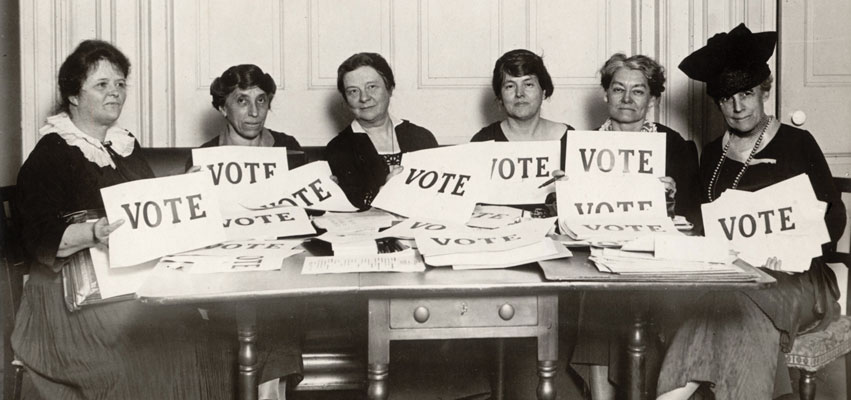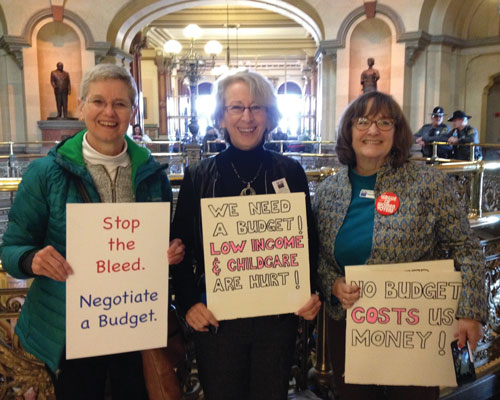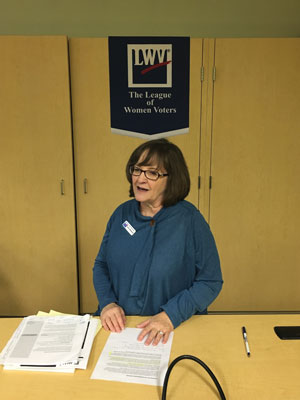Making Democracy Work for All

The organization has three purposes: to foster education in citizenship, to promote forums and public discussion of civic reforms, and to support needed legislation.
This issue devoted to government would not be complete without information about one of the nation’s most trusted and effective good-government organizations: the League of Women Voters (LWV). The League has long enjoyed a positive reputation as a nonpartisan, grassroots political organization. Being nonpartisan means we do not support or endorse candidates or political parties; however, the League is very political, working on voting and public policy issues at the local, state and national levels.
We are thought of as an earnest, civic-minded organization, best known for hosting candidate debates and distributing voter guides to keep the citizenry informed. The League is a recognized force in molding political leaders, shaping public policy and promoting citizen participation at all levels of government.
As a nonprofit, nonpartisan organization, the League encourages the informed and active participation of citizens in government, works to increase the understanding of major public policy issues, and influences public policy through education and advocacy. Membership is open to both men and women 16 years of age and older. The Peoria League has had men serve as president, and men currently represent more than a third of the membership.
 A Rich National History
A Rich National History
Nationally, the LWV started out 97 years ago next month as a “mighty political experiment” designed to help 20 million women carry out their responsibilities as new voters—their right to vote secured after a 72-year struggle to amend the U.S. Constitution. The League encouraged women to use their new power to participate in shaping public policy. Today, both women and men are full participants in the League of Women Voters.
From the beginning, it was apparent that the League’s legislative goals would not be exclusively focused on women's issues, and that education aimed at all of the electorate was in order. For nearly a century, the League has helped millions of women and men become informed participants in government, and it has addressed a diverse range of public policy issues, which continues with the passing years.
In the 1920s, the League sponsored "Meet the Candidates,” the first-ever national radio broadcast of a candidate forum. When the ‘30s brought bread lines, the Dust Bowl and the Great Depression, the League stepped forward and worked tirelessly to build support for the centerpiece of President Roosevelt’s New Deal and the Social Security Act, in addition to advocating for the Food and Drug Acts, Tennessee Valley Authority and merit systems for government personnel. Some League leadership during the 1940s and ‘50s included supporting establishment of the United Nations, where the League still maintains official observer status, and calling out Senator Joseph McCarthy’s red-baiting activities. In response to the growing civil rights crises of the ‘60s, the League directed its energies to equality of opportunity and supporting equal access to education, employment and housing.
Passage of the Equal Rights Amendment was a top priority in the 1970s, in addition to focused action on environmental issues regarding water, air, waste management, land use and energy. The League also sponsored the first televised presidential debates—and won an Emmy for it. The League continued to sponsor presidential debates into the ‘80s, but withdrew prior to the 1988 debates following pressure for control from the campaigns, stating it “has no intention of becoming an accessory to the hoodwinking of the American people.” In the 1990s, after years of hard work, the League helped passage of the National Voter Registration Act, in addition to progress on the Clean Air Act.

Since 2000, the League’s emphasis has been on making democracy work: increased voter turnout, campaign finance reform, civic education, diversity of representation, civic participation and voting representation. More recently, it has started to hone in on money in politics, congressional redistricting and amending the U.S. constitution. The 2013 rollback of key provisions of the Voting Rights Act resulted in voter suppression across the country, and the League has been taking action, including going to court, to allow voters access. After the November 2016 election, Chris Carson, president of the League of Women Voters of the United States, declared, “Every eligible voter should vote, and the election system should help them participate rather than standing in the way. The League of Women Voters will continue to expand participation in the election process and work to give a voice to all Americans.”
Study and Action in Greater Peoria
Locally, the League of Women Voters of Greater Peoria (LWVGP) was chartered in 1924. Starting with 80 members and led by President Julia Proctor White, their first activity was a series of citizenship schools held at the Peoria Women’s Club to inform women on the mechanics of voting. They were active with both study and action on various topics, including being a watchdog of government, voter service, child welfare, women’s rights, and later, zoning, full-time health officer and sanitary districts. Toward the end of the ‘20s, they circulated petitions to allow women to serve on juries, studied a bond issue for motorization of the garbage department, advocated for a zoning plan, produced a weekly radio show and grew membership to 243 members.
In the intervening decades, our local League has never wavered from its principles, including a belief in representative government and individual liberties; a stance that democratic government depends on the informed and active participation of its citizens, and should be responsive to the will of the people; and a belief in the rights of citizens to know about their government, vote, have equal opportunity, and enjoy efficient and economical government.
The Peoria League has either led or been on the team for many important initiatives in Peoria’s history. It helped establish the city council/manager form of government (1953); initiated petition drives that resulted in changing the Peoria City Council to five single-member district and three at-large council positions (1973); argued at the Illinois Supreme Court the results of a referendum (passed by citizens 3-to-1) to reduce the number of Peoria County Board members from 27 to nine (1980s); and sponsored a referendum to consolidate the city and county elections offices (2003).

This past fall, our League was very visible with an aggressive GOTV (Get Out The Vote) campaign that included: sponsoring a screening of the movie Selma; educating young voters with mock elections at seven schools; registering other voters, including new citizens at naturalization ceremonies; and hosting candidate forums in Peoria, Pekin and Washington. Further, with the support of Illinois Central College and the NAACP, we designed and hosted the first candidate school in years for citizens planning to run for office, in addition to presenting two lectures to educate the public on the Electoral College and the various initiatives on the November ballot.
In 2016, the Peoria League conducted a survey of websites of 39 local public bodies to help identify opportunities for them to better serve the public by providing key data that citizens need in order to better understand and participate in the public decision-making process.
We offer various formats for citizens to become informed and involved: monthly general meetings with lectures or panels, monthly Drinks & Dialogue sessions for learning and discussion, and a variety of committees for both study and action opportunities. There is a place for all members to participate in a way that meets their needs. Some join just to support our work, others to become more educated and receive breaking alerts for action, and others to enjoy a hands-on experience in making democracy work.
The League of Women Voters is one of the country’s oldest and strongest nonpartisan civic organizations. Ninety-seven years after its founding, it continues to hold fast to the belief that our nation is strongest when citizens are engaged with our democracy, from voting rights and voter education to campaign finance reform and environmental defense. iBi
To learn more or become a member of the League of Women Voters of Greater Peoria, visit lwvgp.org.

